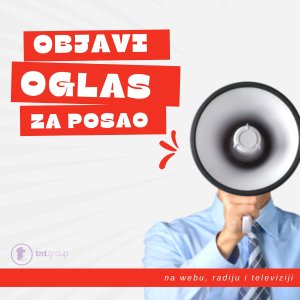Pametna kuća – 5 razloga zašto je važno učiniti svoj dom “pametnim”
Pogledajte nekoliko razloga zbog kojih vam "pametna kuća" može olakšati život.
Prije nego što uđemo u razloge zašto "pametna kuća" toliko popularna danas, moramo razjasniti...
KOŠARKAŠ MAKABIJE UVJEREN: Bili bismo u vrhu da nije počeo...
Maccabi Košarkaši su poveli sa 1:0 u...
5 razloga zašto bi trebali učiniti svoju kuću “pametnom”
Pogledajte zašto je "pametna kuća" vaš savršen izbor za olakšavanje života.
Da bismo razumjeli zašto je "pametna kuća" tako popularna,...
Dekorater igračaka/dekoracija i montaža – 20 izvršilaca
Koala automotive doo Tuzla raspisuje oglas za prijem radnika u radni odnos na sljedeću radnu poziciju: Dekorater igračaka/dekoracija i montaža – 20 izvršilaca.
Uslovi:
Nekvalifikovani radnik...
ADNA HELIĆ PORUČUJE NAKON HAPŠENJA: PUSTITE IH DA MISLE DA GUBIM
Na slici koju je danas objavila, Adna Helić je napisala: "Najveća snaga koju čovjek može nositi sa sobom je čista savjest."
INFLUENSERICA ADNA HELIĆ SE...
ATP MADRID: Kecmanović za sat vremena u drugom kolu!
Srpski teniser Miomir Kecmanović plasirao se u drugo kolo Mastersa u Madridu.
...
Kako provjeriti brzinu RAM-a i koja vrsta RAM-a je potrebna? –...
Provjeri brzina radne memorije je od velike važnosti za performanse računara
Poznavanje brzine RAM-a je ključno za optimizaciju performansi i izbjegavanje nepotrebnih troškova.
U nastavku teksta...
Deset najpopularnijih filmova u EON Video klubu u Bosni i Hercegovini
Novo, poboljšano izdanje EON Video kluba, najveće platforme video sadržaja dostupnih na zahtjev u Bosni i Hercegovini, korisnicima Telemacha je otvorilo vrata u svijet...
Sportske novosti
Siner: Još uvijek nisam na nivou Đokovića
Italijanski Teniser ostaje skromna osoba zbog čega obiluje tolikim pristalicama.
U vezi s tim je...
MaxBet postaje generalni sponzor 3×3 lige u Bosni i Hercegovini
Kompanija MaxBet postala je generalni sponzor basket takmičenja nazvanog 3x3 MaxBet liga.
Ovo sportsko takmičenje...
Međedović se plasirao u glavni ždrijeb Mastersa u Madridu!
Mladi tenisač Hamad Međedović plasirao se u glavni ždrijeb Masters turnira u Madridu.U drugom kolu kvalifikacija uvjerljivo je pobijedio Argentinca Francisca Komesana, 96. igrača...
Olgu Danilović uvrštena u glavni ždrijeb Madrida!
Srpska tenisačica Olga Danilović uspjela je proći kvalifikacije za Masters u Madridu....
Đoković otkrio: Želim učestvovati na Igarama u Los Angelesu
Najbolji teniser svih vremena Novak Đoković sinoć je u Madridu proglašen najboljim sportistom u...
Skandal u svijetu plivanja: Rivalka Lane Pudar bila dopingovana prije OI, ali nije kažnjena
Svjetska antidoping agencija je potvrdila da su 23 kineska plivača i plivačice bili pozitivni...
Međedović blizu plasmana na masters u Madridu!
Hamad Međedović, srpski tenisač, uspješno se plasirao u drugo kolo kvalifikacija za Masters turnir...
NOVAK ĐOKOVIĆ POBJEDIO U VELIKOJ KONKURENCIJI: Peti put osvojio prestižnu Laureus nagradu!
Tenisač Novak Đoković iz Srbije je dobitnik nagrade "Laureus" za najboljeg sportistu svijeta u...
Poslovni dnevnik
Ovo su 10 najinteligentnijih gradova na svijetu
Broj pametnih gradova raste u Evropi i Aziji, dok sjevernoamerički gradovi gube na rang listi prema Indeksu pametnih gradova za 2024. godinu.
Od 10 najboljih pametnih gradova na listi, sedam se nalazi u Evropi.
Opservatorija za...
Upoznajte suosnivače CVC Capital Partners-a koji će postati milijarderi
Britanska kompanija za privatni kapital CVC Capital Partners planira da se u petak kotira...
Najbogatiji 0,001% ulaže svoj novac: Evo gdje
Ultra bogati ljudi žive na potpuno drugačijem nivou od većine svijeta, pa čak i...
Podrška mladim poslovnim idejama u TK kroz IMPAKT projekte – Poslovni Magazin
Neki gradovi i općine Tuzlanskog kantona podržavaju mlade ljude u pokretanju biznisa
Ministar za kulturu,...
Prolaz srama: Kako je njemački lanac supermarketa privukao pažnju američkih kupaca.
Caitlyn Pratt je strastvena kupoholičarka u Aldiju, toliko da redovno prelazi državne granice kako...
Tehnologija
Samsung Galaxy Z Flip6 dostupan u različitim bojama
Kako vratiti kategorije obavijesti na One UI 6.1
Očekuje se da će Samsung predstaviti svoj nadolazeći Galaxy Z Flip6 u srpnju, na posebno organiziranom Unpacked...
Kako provjeriti brzinu i odabrati pravu vrstu RAM memorije?
Bitno je provjeriti brzinu radne memorije jer informacije o tome mogu otkriti performanse vašeg računara
Znanje o brzini vašeg RAM-a je važno jer vam omogućava...
Pametna kuća – 5 razloga zašto bi trebali učiniti svoj dom “pametnim”
Pogledajte nekoliko razloga zašto vam "pametna kuća" može olakšati život.
Prije nego što uđemo u...
Kako provjeriti brzinu RAM-a i koju vrstu RAM-a vam je potrebno?
Provjerite brzina radne memorije važna je informacija o performansama vašeg računala.
Poznavanje brzine rada vašeg RAM-a važno je za optimizaciju performansi i iskorištavanje potencijala.
Bez obzira da li planirate nadogradnju ili rješavanje problema s performansama, važno je znati detalje o brzini rada RAM-a.
Korištenje upravitelja zadataka za...
Moondrop MIAD 01 – Povezanost zvuka i tehnologije
Moondrop je nedavno predstavio svoj prvi pametni telefon, nazvan MIAD 01, akronim koji označava Mobile Internet Audio Device. Ovime se naglašava važnost audio performansi...
DOM I PORODICA
ZAŠTO JE MAMA REKLA SVOJEM SINU DA SE ODBRANI AKO GA NEKO UDARI
Jedno od pitanja s kojima se roditelji često suočavaju je kako dijete treba reagovati ako ga udari vršnjak? Skoro je nemoguće da se to ne desi barem jednom - u parku, na igralištu, u školi, i roditelji tada nisu sigurni da li da dijete...
Dirljiv susret vlasnika sa ljubimcem: Pas izgubljen u Grčkoj se nakon godinu dana pojavio u Loznici.
PAS-i-Remi.jpg" class="attachment-large size-large wp-post-image" alt="" />
Misterija kako je PAS stigao u Srbiju će ostati...
NEPOZNATE ČINJENICE O DEPRESIJI
Depresija sve više pogađa ljude i često se poistovjećuje sa apatijom, lošim raspoloženjem i...
Kako odabrati idealnu sofu?
Nakon napornog radnog dana, posjete prijatelja tokom vikenda, gledanje omiljene serije, čitanje knjige, drijemanje......
Psihologinja s Harvarda postavlja svom djetetu neočekivana pitanja svakog dana nakon škole.
Porast anksioznosti među tinejdžerima i mladima dostigao je rekordni nivo. Stručnjaci su identifikovali različite...
Lifestyle
Neodoljivo rupičasto pletivo: Savršen izbor za oblačne proljetne dane
Proljeća su nas vratila razigranim i lepršavim modnim kombinacijama, dok su modni brendovi najavili...
Istinska ljubav: Priča o Armini i Saudinu, slabovidnoj djevojci i slijepom mladiću iz Kiseljaka
Mladića iz Kiseljaka, djevojku iz Gračanice, život je doveo u Sarajevo i učinio da...
Pravnik je otkrio “trikove” kako ne ostati bez ičega nakon razvoda: “Napasti tužbom dok traje brak, ne čekati…”
Sve češće se dešavaju razvodi dugogodišnjih brakova javnih ličnosti i intrige koje stoje iza...
Severini ili Irini Shayk: Kome bolje stoji zlatna, šljokičasta haljina?
Hrvatska pjevačica Severina nedavno je nastupila u Zadru, a za ovaj koncert je odabrala...
8 najboljih tura za pješačenje u Evropi: Savršene destinacije za ljubitelje šetnje (FOTO)
Popularne planinarske ture u Evropi nisu rezervisane samo za gradove; one uključuju uživanje u svežem vazduhu i impozantnim predelima.
Evropa nudi brojne staze za planinarenje, od Mediterana do nordijskih zemalja.
Šetnja do Mon San Mišela u Francuskoj
Umjesto uobičajenih tura po francuskim gradovima ili mediteranskim plažama, posjetite...
ESTRADNE NOVOSTI
HARIS DŽINOVIĆ TRAŽI ŽENU: “Kvalitetan sam kuhar i pjevač, a spreman sam i na kompromise”
Haris Džinović je okončao brak sa modnom dizajnerkom Melinom nakon dvije decenije ljubavi i...
Dok svijet brine zbog Kate Middleton, još jedna evropska princeza bori se sa teškom bolešću
Vijesti o zdravstvenom stanju princeze Mette-Marit iz Norveške su rijetke, ali važne. Ona od...
Ljubav na setu “Survivora”: Katia Žunić i Jakob Kosić otkrivaju kakav je njihov odnos nakon showa
Na ovogodišnjem "Survivoru" osim razvijanja dobrih prijateljskih odnosa, dogodile su se i neke ljubavne...
Proteklo 20 godina od sastanka Željka Bebeka i Gorana Bregovića: Otkriveni detalji o neprijatnom susretu
Bijelo dugme će 11. maja početi turneju koncertom u Sarajevu. Goran Bregović, Alen Islamović,...
Nijepravedni princ Louis slavi svoj šesti rođendan: Ovim ludorijama je nasmijavao ljude širom svijeta
Princ Louis, najmlađi sin prestolonasljednika princa Williama i njegove supruge, princeze od Walesa, 23. aprila slavi šesti rođendan, zbog čega će pažnja svjetske javnosti ponovno biti usmjerena na zbivanja u Kensingtonskoj palači. S obzirom na to da se Kate Middleton oporavlja od zloćudne bolesti,...
Auto NET
ZANIMLJIVO
JEDAN OD NAJPOPULARNIJIH UTICAJA U ŠPANIJI OČARAO BIVŠU ZVIJEZDU BARCELONE
Jessica Goicoechea, jedna od najpopularnijih influencerica u Španjolskoj, zapala je za oko bivšoj zvijezdi...
Kako nas Ryan Gosling i njegov novi film podsjećaju na našeg čovjeka kojeg su Prle i Tihi ubili preko 100 puta
Ryan Gosling odaje počast kaskaderima u svom novom filmu Fall Guy, pa je ovo...
Jelena Đoković dokazala da je manje zaista više u haljini domaćeg dizajnera
Jučer je Jelena Đoković zablistala u Madridu u dizajnu Dragane Ognjenović. Na svečanosti dodjele...
Harmonikaš Samir Nurkić izveo Rim Tim Tagi Dim, publika oduševljena: Ludilo
Ludnica Baby Lasagna i njegov eurovizijski hit Rim Tim Tagi Dim već nekoliko sedmica...
Oprezno s količinom: Ovo voće korisno je za jetru, ali ne pretjerujte
Mislite da nemate razloga za brigu o svojoj jetri jer ne konzumirate često alkohol? A jeste li čuli za nealkoholnu masnu bolest jetre? Jetra...
Najstariji pastir u BiH proslavio 90. rođendan: Bilo mi je neugodno uzeti toliko novca
Najstariji čuvar ovaca u Bosni i Hercegovini proslavio je 91. rođendan. Nedo Milutinović iz Bugojna i dalje brine o ovcama i uživa u prirodi...
vijesti ba iz minute u minutu
Vijesti ba iz minute u minutu
Javno.ba je domaći portal koji donosi vijesti ba iz minute u minutu uz zanimljive članke i korisne informacije. U svakom trenutku saznajte sve što se događa oko vas.
Vijesti ba iz minute u minutu iz Bosne i Hercegovine i regije, sportske novosti, rezultati utakmice uživo i poslovne vijesti iz minute u minutu. Ne zaboravite pratiti (i objavljivati) nove oglase za posao i pročitati korisne savjete za dodatni prihod od kuće.
Za naše drage dame donosimo super trikove vezane za ljepotu i savjete stručnjaka za zdravlje i mršavljenje.Naravno, astrologija i dnevni horoskop su kategorija koju svi pratimo da vidimo što nas čeka… Ali i vremenska prognoza (za svaki slučaj). Ukratko, na javno.ba imate sve što trebate.
Nezavisni portal od 2008. godine

Vijesti ba iz minute u minutu od 2008. godine
Neovisni portal Javno.ba je osnovan 2008 godine. Dugi niz godina je bio jedan od pet najpopularnijih portala u Bosni i Hercegovini, ali je iznenada nestao sa scene. Nakon nekoliko godina pauze, portal je ponovno aktivan i jači nego ikad!
To potvrđuje i podatak da smo u mjesec dana od lansiranja zabilježili gotovo 30 tisuća posjeta (70% sa tražilica). Rastemo iz dana u dan zahvaljujući vama, našim korisnicma-
Naš osnovni cilj je informiranje korisnika tako što donosimo Vijesti ba iz minute u minutu sa raznih izvora. Na vama je da zaključite što je istina, a što spin ili laž.
U svakom slučaju, svaku vijest možete prijaviti kao laž, naši urednici će odmah da reagiraju na dojavu da utvrde da li zaista neka informacija onakvom kakvu je objavio izvorni medij. Dugme za prijavu se nalazi na dnu svakog članka na javni.ba.

Novi koncept portala Javno.ba je da se razlikuje od ostalih novinskih portala u BiH. Osim najnovijih vijesti ba iz minute u minutu, želimo Vam pružiti korisne informacije vezane uz svakodnevni život i testove koji mogu pomoći našim korisnicima.
Molimo vas da uzmete u obzir da je portal JAVNO.BA još uvijek u beta fazi razvoja. Da bismo zaista mogli da vam omogućimo vijesti iz minute u minutu potrebno je da testiramo što više izvora vijesti i drugih sadržaja.
Gotovo svakodnevno dodajemo i uklanjamo izvore vijesti u skladu sa vašim dojavama te specijaliziranim sajtovima poput raskrinkavanje.ba koji se bore protiv širenja lažnih vijesti na internet medijima.
JAVNO – Vijesti ba iz minute u minutu

Javno.ba je danas dio nezavisne medijske grupacije TNT Group, jedne od vodećih medijskih kuća u regiji. TNT Grupaciju čini 7 radio postaja, 4 tematske televizije i 60 digitalnih medija u Bosni i Hercegovini, Srbiji i Hrvatskoj.
Nadamo se da će naš portal zadovoljiti vaše želje i potrebe za vijesti iz minute u minutu. Za sve dodatne sugestije slobodno nam se javite putem kontakt stranice.
Ukoliko imate potrebu za oglašavanjem, objavom PR vijesti i guest post objavama, stojimo vam na raspolaganju. Hvala vam što ste uz nas. Idemo naprijed!













